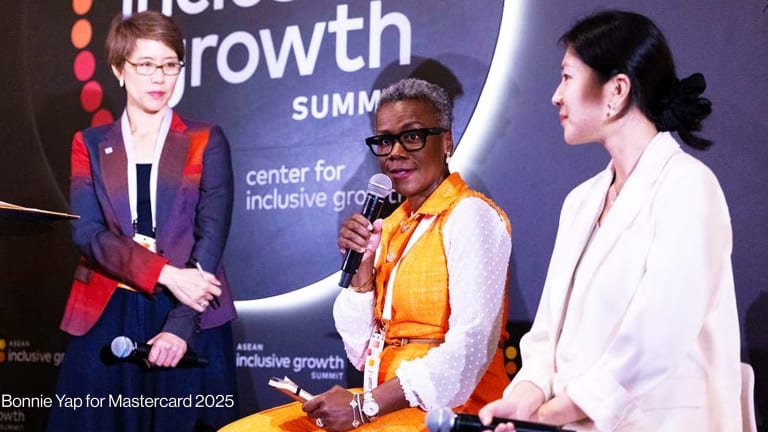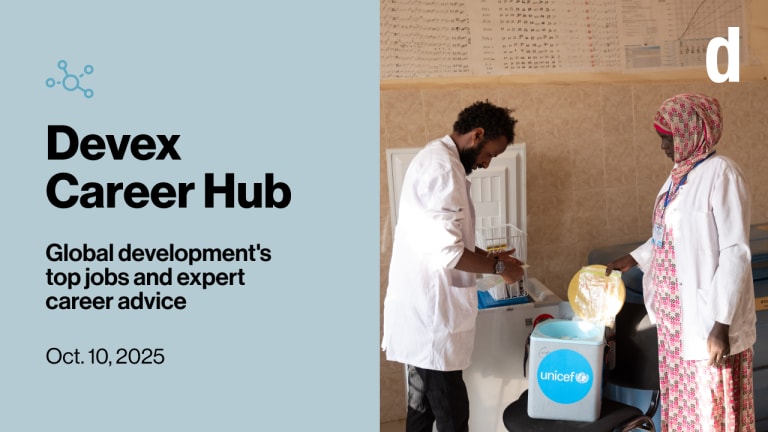
Data can be messy. That’s what Neelima Grover, founder and chief executive officer of QED Group, an international consulting firm specializing in solving complex global challenges, told Devex. “It’s all over the place. It’s sitting in different information systems and in paper piles.”
There’s nothing new there, but what is new is how evolving techniques in visualization, human-centered design, and modelling are transforming the monitoring and evaluation process. And more in-depth insights are allowing global development organizations to better learn from data.
From there, development practitioners and decision-makers can make better informed choices about the work they do, whether in redistributing funds or changing a project approach. The result? The use of data is transforming development.
“Today, there are techniques and technologies available to really make data come alive. Yes, data is complicated, yes, data is messy, but if you apply new techniques you can really get your hands on the data,” said Grover.
Sitting down with Devex, Grover explained why it’s this step up in the level of M&E learning that means the process needs a new name and she gives her top tips on how development practitioners should be using data.
This conversation has been edited for length and clarity.
How is data transforming M&E and project design, specifically within the development sector?
The data revolution is affecting everything, right? There’s been an exponential growth in available data across all industries and there are incredible opportunities for doing all kinds of things with data: Predictive analytics, data analysis, and really understanding and mining the data to test the “what if” situations that could arise going forward.
With this in mind, given the fact that data is proliferating in every aspect of our life today, it’s also transforming the M&E space, but I like to think of it not as M&E but as ME&L. It’s very important that the “L” stands for “learning.”
“When you have access to data, you get objective information that helps people to better understand, ask the right questions, and make more informed decisions.”
— Neelima Grover, founder and CEO of QEDWhat’s happening is three things: First, the sheer amount of data we have access to today is really amazing — it's unprecedented. Secondly, we have technology and tools now available that we didn’t have in the past to better understand and mine this data. Twenty years ago, when I started QED, I remember looking through hard-copy files and transcribing information into Excel spreadsheets. Now QED has data scientists working on three continents trying to mine, model, and analyze data in minutes that would have previously taken us months to collect and analyze.
The third thing is that it’s really important to understand the learning component of ME&L. It's not just that we have much more data, but that we now have the ability to really learn from that data. That's something that has been very unique about our work over the years. It's not just mining the data but translating that into actionable information and insights.
How exactly can that data be used to provide insights and better inform decision-making and project design?
When you have access to data, you really get objective information, so it helps people to better understand, ask the right questions, and be informed.
A few years ago, we were working in a particular country with the United States Agency for International Development mission there, looking at some of the trends going on around youth unemployment. We did a survey, collected data, and did some predictive modeling. We came to the conclusion that there was a real issue brewing in the country with high youth unemployment rates that could have adverse long-term impacts on the country’s social and economic fabric.
There would be all kinds of security risks and other challenges if something was not done to really prepare for the youth becoming adults. So, we took the data to our client and we shared the predictive modeling and it really was a transformative time because the data showed very objectively the impact of what was going on.
Understanding how research can better engage aid policy
At the 2018 Australasian Aid Conference, a new report from the Research for Development Impact Network outlined the impacts the research community has had on aid policy. Speaking with Devex, RDI Network Project Steering Group member Joanne Crawford discussed the findings and recommendations for both researchers and donors to create an aid program that better utilizes evidence-based policy.
As a result of that, they galvanized action, engaged politically and locally on the ground and changed policy to really address the situation with youth in a much more holistic manner. This is an example where the data was very powerful in not only providing insights, but in informing decision-making and policy across sectors. This is what I view as the power of data.
Data modelling can really help to understand the “what if” scenarios and then help you drive decisions based on fact. Once you understand what the data is telling you, it can also create much more targeted interventions.
To complete that story, I met the mission director at USAID a few months ago and he shared with me that the predictive modeling and the work that we did many years ago was an “aha!” moment for them. It had a transformative impact on how they were going to be implementing some of their programs going forward, given the fact that they had this information that allowed them to be much more targeted in what they were going to be doing in-country.
What advice do you have for those development practitioners beginning projects or programs that could help them in regard to ME&L?
First, I think development practitioners should really ask the right questions: Why are we doing ME&L, what’s the purpose, what are the pain points we’re trying to address, and how can the information generated from the M&E translate into the “L” for the outcomes that need to be achieved? Ask the right questions from the get-go.
Secondly, I think it's important to approach programs in terms of data, metrics, and targets throughout. And you should look at ME&L work in the context of that.
The third thing is that we really need to think about ME&L from the very beginning of program design. We’ve been instrumental in moving M&E from a compliance function to an information generation function and that's the way I think we need to all think about it in the development field.
Another important point to make here is that development practitioners should think about data as the fuel and it's important to look at the context within which the program is being operated, so it’s a combination of data plus context. Data provides the objective activity and then you have the contextual information that really provides more of what you need to interpret the data in the context of what is going on. Unless you really understand the local context, you’re not going to be successful in translating and learning from data and all the data in the world won’t be beneficial.
Devex World is on June 12, 2018 at the Mead Center for the American Theater in Washington, D.C. and QED is one of the event’s changemaker partners. Find out more about the event here.








